Qunut in Ramadan: An Emotional Tale Resonating with Gaza's Struggle
Qunut, Ramadan, Ayyash, Prophet, Gaza, Muslim suffering, Witr
During the sacred nights of Ramadan, prayers conclude with deeply emotional supplications. Especially during the Qunut of Witr, as believers raise their hands in supplication to Allah during the last ten days of this blessed month, it feels as if even the very walls of the mosque join in, shedding tears of spiritual longing. This unique act of devotion, specific to Ramadan, holds profound significance.
In the realm of Islamic jurisprudence, Qunut in the Witr prayer stands out as a hallmark of Ramadan. According to the Shafi'i Madhhab, Apart from the Farjr prayer, Qunut is practised in the Witr prayer during the latter half of Ramadan. Additionally, there's the Qunut of nazilat, a special supplication invoked during times of crisis. Conversely, the Hanafi and Hanbali Madhhabs advocate observing Qunut in Witr as a cherished Sunnah throughout the year. While the Hanafi tradition holds Qunut before the bowing posture, other Madhhabs permit it after rukua’. The details regarding when and how Qunut is performed may vary across different Madhhabs, yet each upholds its significance with reverence.
The historical roots of Qunut take us back to the turbulent era of migration to Madinah, where early Muslims endured relentless persecution in Makkah. Notably, companions like Ayyash bin Abi Rabi'ah, Hisham bin AlAs, and Waleed bin Alwaleed exemplified unwavering faith amidst unimaginable trials.
Narrated by Abu Huraira (RA): "Whenever the Prophet (PBUH) raised his head from the last Rakat, he would say: 'O Allah! Save Ayyash ibn Abi Rabi'ah, O Allah! Save Salamah ibn Hisham, O Allah! Save Walid ibn Walid, O Allah! Save the weak and oppressed believers among us.' " (Sahih Bukhari)
Walid ibn Walid: Ibn Hajar mentioned in "Al-Isaba fi Tamyiz Al-Sahaba": "The paternal brother of Khalid ibn Walid. He participated in the Battle of Badr alongside the pagans, where he was captured and later ransomed by his brothers: Hisham and Khalid. Upon his ransom, he embraced Islam. Subsequently, his paternal uncles imprisoned him.
Salamah ibn Hisham: Ibn Al-Athir mentioned in "Usd Al-Ghaba fi Ma'rifat Al-Sahaba": "Salamah ibn Hisham ibn Al-Mughirah Al-Qurashi Al-Makhzumi embraced Islam early. He was the brother of Abu Jahl ibn Hisham and the cousin of Khalid ibn Walid. He was among the elite companions, migrating to Abyssinia. Salamah was prevented from migrating to Medina and was tortured in the cause of Allah, and the Prophet (PBUH) prayed for him during Qunut along with other oppressed believers."
Ayyash ibn Abi Rabi'ah: Ibn Abdul Barr mentioned in "Al-Istiab fi Ma'rifat Al-Ashab": "Ayyash ibn Abi Rabi'ah, the maternal brother of Abu Jahl ibn Hisham, was among the first to embrace Islam before the Prophet (PBUH) entered Dar Al-Arqam. He migrated to Abyssinia and then to Medina, combining both migrations...
The Story of Ayyash
Ayyash, an esteemed Companion who embraced Islam before the Prophet's migration, undertook the journey to Madinah with Umar, demonstrating his deep commitment to the faith.
Notably, Ayyash shared familial ties with Abu Jahl, being his maternal brother. Upon learning of Ayyash's migration to Madinah, Abu Jahl, accompanied by his brother Harith Ibn Hisham, ventured to Medina with the intention of persuading Ayyash to return to Makkah.
Approaching Ayyash, Abu Jahl and his brother used clever words: “Your mother vows to fast, abstain from grooming, and even refuse basic comforts until she lays eyes on you again. Join us, and you'll bring joy to your mother's heart. You can still practice your faith in Makkah. Surely, your mother's happiness is of utmost importance, isn't it?" Hearing this, Ayyash felt torn between his love for his mother and his faith. Despite, Umar(ra) warnings about Abu Jahl’s deceitful nature, Ayyasg was swayed by the promise of practicing Islam in Makkah and making his mother happy. His love for her clouded his judgment.
However, as fate would have it, Ayyash's decision led him into a trap orchestrated by Abu Jahl and his brother. Upon reaching Baida'a near Madinah, they forcibly brought Ayyash before his mother, who demanded that he renounce Islam. Refusing to yield to her pleas, Ayyash endured days of agonizing torture at their hands. Alongside fellow companions like Hisham bin Asw, he faced unspeakable cruelty in a torture center in Makkah. However, Ayyash's faith remained unshaken, serving as a testament to the resilience and solid commitment of early Muslims in the face of adversity.
During this time, the Prophet (peace be upon him) migrated to Madinah, deeply troubled by the plight of the hostages in Makkah. All they could do was pray ardently, mentioning their names in every supplication. The Prophet instructed special prayers to be made for their release, specifically naming each one in the last rakat of prayers, thus incorporating Qunut into the prayer.
However, Ayyash and his group remained hostages in Makkah for years. Eventually, the Muslims in Madinah grew stronger, and the call for the Battle of Badr arose. Among the enemy ranks stood Waleed Ibn Waleed, son-in-law and paternal cousin of Abu Jahl. He was captured as a prisoner of war, and his relatives, including his brother Khalid and Hisham, came to the Prophet with ransom money to secure his release.
After the ransom was paid, Waleed returned home with his relatives. However, upon reaching Mecca, to everyone's astonishment, Waleed embraced Islam and declared his intention to go to Medina himself. This unexpected turn of events angered his brothers, who imprisoned him and sent him to the torture center, questioning why he hadn't revealed his intentions earlier.
Years passed, marked by battles and victories, yet Ayyash and his companions remained imprisoned in Mecca, a constant reminder to the Muslims of their suffering. Then, one day, as the Prophet and his followers gathered, they noticed a figure approaching from a distance. As he drew nearer, they realized it was Waleed, who had miraculously escaped from prison in Mecca and made his way to Medina without anyone's knowledge. The believers rejoiced at the news, but the thought of Ayyash and Hisham's continued suffering weighed heavily on their hearts.
One day, the Prophet (peace be upon him) addressed his followers, asking who would undertake the daunting task of rescuing Ayyash and Hisham from their imprisonment in Mecca and bringing them safely to Medina. Upon hearing this, Waleed (may Allah be pleased with him) volunteered, expressing his determination to fulfill the mission with the Prophet's prayers as his support. The Prophet's heart overflowed with joy, knowing that Waleed would undoubtedly carry out the task entrusted to him.
Setting out for Mecca in disguise, Waleed embarked on a perilous journey fraught with risks. Along the way, he encountered a woman carrying food and inquired about its destination. Learning that she intended to feed two prisoners, Waleed sensed that these prisoners were none other than Ayyash and Hisham. He believed that the woman was divinely guided to aid him in his mission.
Following the woman's lead, Waleed discovered the dungeon where Ayyash and Hisham were held captive. Confirming their identities, he stealthily retreated and spent the night nearby, concealed from view, as he prepared to execute his plan.
As midnight enveloped the world in tranquility, Waleed stealthily approached the dungeon, his footsteps unheard amidst the silence. With utmost caution, he leaped over the roof and entered the confines of the prison. Gently untying Ayyash and Hisham, Waleed led them away, embarking on the journey to Madinah. After enduring many trials, the trio finally arrived in Madinah.
The Holy Prophet's eyes brimmed with tears of joy upon beholding the triumphant return of the three companions. Witnessing this heartfelt reunion, believers couldn't help but express their gratitude to Allah, wiping tears of emotion from their eyes. These enduring memories continue to echo through the Qunut prayers to this day.
As we reflect on the powerful journey of faith and redemption recounted above, we are reminded of the enduring struggles faced by the people of Gaza today. Just as Ayyash, Hisham, and Waleed persevered through hardship with unwavering faith, so too do the resilient souls of Gaza endure amidst adversity. In the face of conflict and turmoil, our prayers for peace and relief echo through the night, much like the Qunut prayers offered by the Prophet and his companions.
Inspired by their resolute faith, let us, too, raise our hands in prayer during the sacred nights ahead, knowing that Allah is always with us.
Written by Saleem Hudawi Chiyyannor, a graduate of Darul Huda Islamic University and currently based in Qatar. Originally published in Malayalam on the Islamonweb Malayalam website, this article has been translated and edited by Faisal Niyaz Hudawi for contextual relevance.
Disclaimer
The views expressed in this article are the author’s own and do not necessarily mirror Islamonweb’s editorial stance.

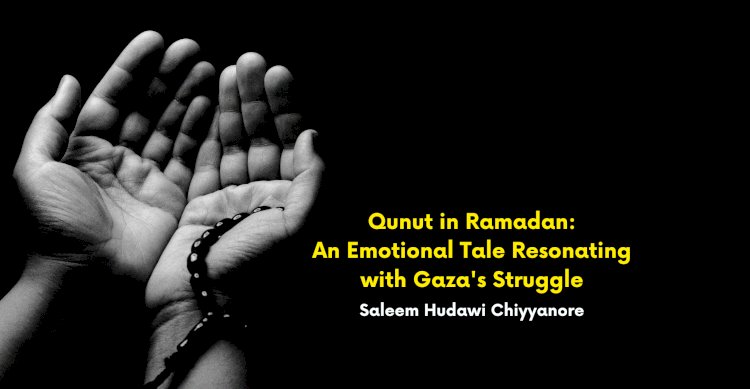



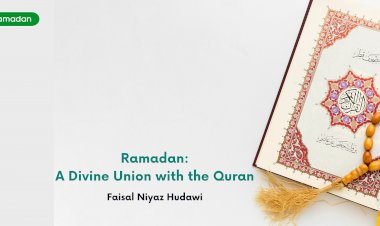
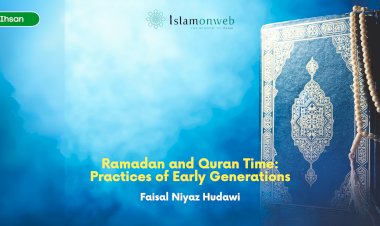
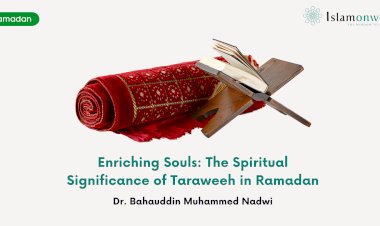
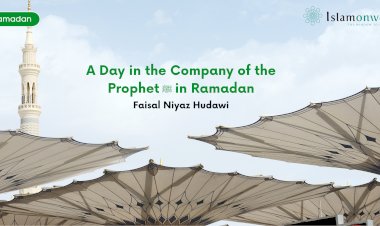















Leave A Comment